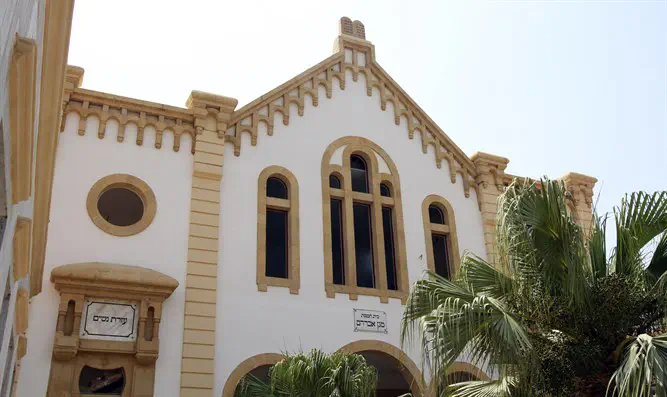by Arutz Sheva Staff
The only remaining synagogue in the country, Beit Abraham, was severely damaged and it's doubtful whether it can be restored.

Maghen Abraham synagogue in Beirut REUTERS
In Lebanon, new updates continue to roll in regarding the heavy damage caused by the explosion in the port of Beirut last week.
According to local reports, the only remaining synagogue in the
country, Maghen Abraham, was badly damaged and it is now doubtful
whether it can be restored.The synagogue has been inactive for years, but Lebanese authorities have preserved it as a historic site. It's located in the Wadi Abu Jamil district in downtown Beirut, where the city's Jewish quarter used to stand, a few kilometers from the port of Beirut.
Built in 1925, it is the oldest Jewish house of worship in the Lebanese capital, and was named after the son of Abraham Sassoon, Moise Abraham Sassoon of Calcutta. It was built on land donated by Raphael Levi Stambouli, and designed by the architect Bindo Manham.
Due to difficulties in financing the project, the head of the Jewish community of Lebanon, Yosef Farhi, ended up assisting with the purchase of religious items as well as the inside structure of the building. A number of social institutions situated their offices in the synagogue's courtyard.
In 1936, due to the ongoing fighting, Yosef Farhi decided to transfer the Torah scrolls to Geneva, entrusting them to Edmond J. Safra, a Jewish banker of Lebanese descent, who kept them in his safes.
Lebanon's Jewish community once numbered up to 22,000, when the country served as a refuge for those who fled the Spanish Inquisition. But Jews fled the country during the 20th century, until finally even the Maghen Abraham Synagogue closed its doors in the mid-1970s.
After 1951, only two Jews remained in the Wadi Abu Jamil area of Beirut, just 60 in the entire country, with the once-prominent community virtually ceasing to exist. In 1976, a year after the civil war began, the synagogue closed, and the Torah scrolls were taken to Geneva, where they were given to renowned Jewish-Lebanese banker Edmond Safra. There they were placed in Safra's bank vault, where they were stored until they were eventually relocated to Sephardic synagogues in Israel.
At the end of the civil war, Lebanese Prime Minister Rafic Hariri decided to rehabilitate the synagogue and surround it with a garden. The plan did not materialize, but the synagogue is considered a historical site.
Arutz Sheva Staff
Source: http://www.israelnationalnews.com/News/News.aspx/284967
Follow Middle East and Terrorism on Twitter
No comments:
Post a Comment